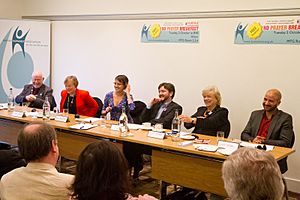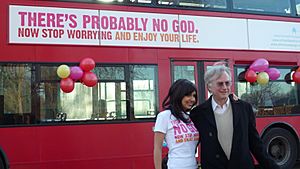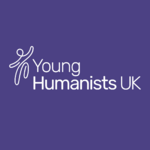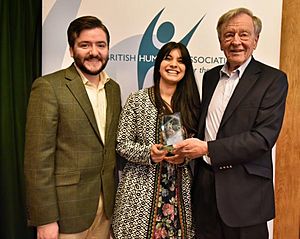Humanists UK facts for kids
Humanists UK is a charity that helps people who live good lives without religious beliefs. From 1967 to 2017, it was known as the British Humanist Association (BHA). This group supports people in the United Kingdom who believe in secular humanism. They work to protect human rights and promote secularism, which means keeping government and public services separate from religion.
The charity also helps with non-religious ceremonies. These include funerals, weddings, and baby naming events. They have trained people called celebrants who lead these ceremonies. Humanists UK also has volunteers who offer support to non-religious people in hospitals and prisons. They provide free learning materials for teachers and parents. They also help people who want to leave strict religious groups. The group works to create understanding between religious and non-religious people.
The current president of Humanists UK is Adam Rutherford. The chief executive is Andrew Copson. The organisation has about 100,000 members and supporters. It also has 70 local groups across the UK.
Humanists UK has special sections for Wales and Northern Ireland. These are called Wales Humanists and Northern Ireland Humanists. They work on local issues in Cardiff and Belfast. They also help more people get humanist ceremonies and support in those areas.
Contents
What Does Humanists UK Do?
The main goals of Humanists UK are set out in their rules. They aim to:
- Promote Humanism: This is a way of life based on reason and kindness. It focuses on human well-being and understanding the world through science and experience.
- Advance Education: They want to teach people about Humanism. They also share knowledge about how arts and science connect with humanist ideas.
- Support Equality and Rights: They work for fairness and against discrimination. They protect human rights, especially when it comes to religion and beliefs.
- Encourage Understanding: They help people with different beliefs get along. This creates a more peaceful society.
Humanists UK also wants to be a strong voice for non-religious people across the country.
A Brief History of Humanists UK
How It Started
The organisation began in 1896. It was founded by an American named Stanton Coit. Back then, it was called the Union of Ethical Societies. It brought together different ethical groups in Britain. Important early leaders included Lady Elizabeth Swann and Zona Vallance. The writer Leslie Stephen, father of Virginia Woolf, was also a founder.
The name changed to the Ethical Union in 1920. In 1963, H. J. Blackham became the first executive director. The group became the British Humanist Association in 1967. This happened when philosopher A. J. Ayer was president.
Growing and Changing
In the 1960s, the group worked to change laws about religion in schools. They wanted to end old laws about Sunday activities and theatre censorship. They also supported family planning and free speech. Humanists UK aimed to help end world poverty. They also wanted to remove special advantages given to religious groups.
The local ethical groups eventually became humanist groups. These groups now form Humanists UK's network of local humanist groups. They also created a network of celebrants. These celebrants perform non-religious funerals, weddings, and naming ceremonies.
Humanists UK has always cared about social issues. In 1969, they helped start the Social Morality Council. This group brought together people with and without religious beliefs. They worked to find solutions to moral problems in society. Humanists UK has always wanted an "open society" where everyone is included.
The organisation has also spoken out about religious programmes on the BBC. They especially criticised the "Thought for the Day" slot on Radio 4. In 2009, a Humanists UK leader was invited to join a BBC committee on religion and belief.
Becoming Humanists UK
In May 2017, the group changed its name from the British Humanist Association to Humanists UK. Their chief executive, Andrew Copson, said the change was to make the group seem more "open, inclusive, energetic, and modern."
In 2021, Humanists UK celebrated its 125th birthday. They launched a new website about their history. Many important political leaders sent messages of congratulations.
Important Campaigns
Schools and Education
Humanists UK believes that faith schools should not receive money from the government. They argue that these schools can be unfair and separate students. They say that faith schools often don't represent the local community.
The organisation wants to change Religious Education in UK schools. They believe it should include non-religious views, like Humanism. They want all students to learn about different beliefs.
Humanists UK also works against teaching creationism as science in schools. In 2011, they started the "Teach evolution, not creationism" campaign. This led to rules that stop schools from teaching creationism as a scientific fact.
They also campaign against laws that require schools to have daily Christian worship. In 2019, they supported parents who challenged these laws. They also launched a website, Assemblies for All. This site provides ideas for inclusive school assemblies that are not religious.
Through their "Understanding Humanism" website, they offer resources for teachers. These resources help include humanist ideas in lessons.
Government and Society
The organisation campaigns for a secular state. This means public institutions should be separate from religious ones. They believe the government should treat everyone fairly, no matter their beliefs. They point to issues like bishops having special places in the House of Lords.
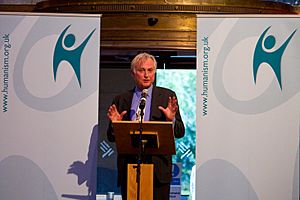
Humanists UK also campaigns on ethical issues. They challenge government funding for homeopathy. They also want fair laws for animal slaughter. They have pushed for 'opt-out' organ donor systems. This means people are assumed to be organ donors unless they say no.
They also work for equal marriage laws. They want humanist wedding ceremonies to be legally recognised everywhere in the UK. They supported legalising same-sex marriage. They also helped make humanist marriages legal in Northern Ireland in 2017.
The charity has always supported LGBT rights. They were against Section 28, a law that stopped schools from talking about homosexuality. They also strongly support banning "gay conversion therapy".
Humanists UK has campaigned for free speech and human rights. They helped change the blasphemy law, which was removed in 2008. They also helped create the Equality Act 2010. This law aims to prevent discrimination.
In 2013, the UK Scout Association and Girlguiding UK changed their oaths. This happened after Humanists UK campaigned to make them fair for non-religious young people.
Raising Awareness
In 2008, Humanists UK supported the Atheist Bus Campaign. This campaign put the slogan "There's probably no God. Now stop worrying and enjoy your life" on London buses. The campaign raised a lot of money and spread across the country.
In 2011, Humanists UK encouraged non-religious people to tick "no religion" in the census. They believed the question made the country seem more religious than it was. The 2011 census showed that a quarter of people in England and Wales had no religion.
In 2014, Humanists UK launched the "That's Humanism!" campaign. This used videos narrated by Stephen Fry to explain Humanism. They also had a "Thought for the Commute" campaign on the London Underground. This featured humanist ideas from famous thinkers.
How Humanists UK is Organised
Presidents of Humanists UK
Humanists UK has had many presidents over the years. These are important people who lead the organisation. The current president is Adam Rutherford.
Staff and Volunteers
Humanists UK has a team of staff members who manage its work. They also have many volunteers. These volunteers help deliver services and support campaigns.
Humanist Celebrants
Humanist celebrants are trained by Humanists UK. They lead non-religious ceremonies like funerals, weddings, and baby namings. Over 8,000 humanist funerals happen in England and Wales each year. Humanist weddings are legally recognised in Northern Ireland.
Pastoral Carers
Humanists UK has about 150 trained volunteers called pastoral carers. They visit non-religious people in hospitals, prisons, and universities. They offer comfort and support, much like religious chaplains do. This network is called the Non-Religious Pastoral Support Network.
Young Humanists
Young Humanists is a group for younger members. It started in 2015 and holds events across the UK.
Supporters and Partners
Many famous people support Humanists UK. These include scientists, writers, and artists. Some well-known supporters are Professor Alice Roberts, Tim Minchin, and Stephen Fry.
Humanists UK is also a founding member of Humanists International. This is a global group for humanists. They also work with other organisations that share their goals. For example, they helped create the Accord Coalition. This group opposes religious separation in education.
Special Events and Awards
Lecture Series
Humanists UK hosts several important lectures each year. These include:
- The Darwin Day Lecture, about Charles Darwin's work and humanism.
- The Rosalind Franklin Lecture, celebrating women in humanism.
- The Voltaire Lecture, about humanism in general.
Many famous scientists, authors, and thinkers have given these lectures.
Annual Award
Since 2011, Humanists UK has given an annual award. It's called the Humanist of the Year Award. It celebrates people who have made special contributions to Humanism. Past winners include authors Philip Pullman and Terry Pratchett.
See also
- All Party Parliamentary Humanist Group
- Atheist, Humanist, and Secular Students
- Disestablishmentarianism
- LGBT Humanists UK
- Non-Prophet Week
- Separation of church and state (UK)



